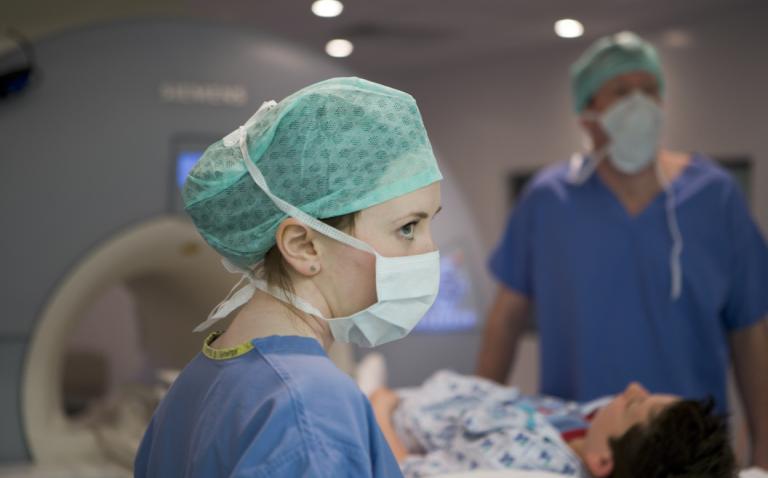In the healthcare sector, integrated technology and digitalisation are making an increasingly vital contribution to enhancing workflow capacity and efficiency, as well as improving patient quality of life and diagnostic accuracy.
Digitalisation of processes and technologies in healthcare means that these technologies now output huge quantities of monitoring and reporting data. This data can be picked up through digital sensors or reporting systems, and can be transmitted (even from remote sites) through mobile technology, across secure internet connections (the ‘internet of things’).
Once received (often in real-time), today’s ‘big data’ analytical techniques are used to derive intelligence, known as Smart Data, that helps improve operating productivity, optimise technology ‘uptime’, refine process flows, trigger pre-emptive maintenance, better align supply and demand, and generally enhance system effectiveness and efficiency.
Digitalised technology is already making strides in the design of prosthetics, currently in substantial demand in the UK, with the NHS estimating over 70,000 knee replacements being carried out each year.1 Key to replacing a shoulder, hip, knee or another joint, is personalisation, and the installation of a prosthetic joint should ideally fit the patient requirements as closely as possible. Automated image segmentation technology is now accurately delineating bone and tissue, and saving technicians hours of time in the surgical planning process for prosthetic joints.

New clinical technology is also combining 3D computed tomography (CT) and live ultrasound images on the same screen, enabling doctors to accurately target lesions as small as 2.5cm. The data-rich environment engineered by the fusion of imaging has significant therapeutic implications, and may potentially lead to quicker diagnosis and treatment, heightened accuracy and lower operating costs, without the risk of added radiation, an advantage for both patients and the healthcare provider.2
Innovative automation systems for hospital laboratories are consolidating the results of various tests, from biochemistry, immunology, haematology and homeostasis onto a single automation track. These systems can greatly accommodate increased volumes, quicken turnaround time (TAT), streamline workflows, and add new tests to improve patient care. At the same time, staff can be redeployed to higher-value activities to provide higher quality service and collaborative support.3
Funding woes in healthcare
Despite the emergence of cutting-edge medical technologies, budget cuts and limited funding opportunities have made investments in equipment acquisition and upgrades increasingly unaffordable for many healthcare providers. The NHS is already under intense pressure to make efficiency savings and it is expected that the health service will face a £30 billion funding gap by 2020.4
Equally, private healthcare providers are also confronted with the challenge of accessing affordable finance, as generalist lenders might not command sufficient expertise to thoroughly understand the applications and benefits of use of the latest technology. As a result, they might be less inclined and less able to provide appropriate funding options. Public and private healthcare organisations are therefore increasingly deploying cost-effective financing techniques to enable technology investment.
Flexible financing empowering healthcare providers
Specialist healthcare financers, with their in-depth knowledge of medical markets and technology applications are working with equipment and technology vendors, to introduce innovative and flexible financing solutions to help healthcare providers take advantage of technological innovations against the backdrop of increased patient volumes and budget cuts.
One financing approach available is Total Cost of Ownership (TCO) financing, which can combine all the costs of using the technology including service, maintenance, consumables and software, not just the acquisition price. TCO helps organisations gain a very clear and transparent understanding of the ‘cost-to-use’ the technology over time and become better informed when it makes more financial sense to upgrade outdated technology rather than continue to “sweat” an old system.
To help healthcare providers keep up with the rapid pace of technological advances, specialist financiers are also offering future proof financing arrangements with built-in points of refreshment for equipment upgrade. Technology developments are increasingly producing systems that operate smarter and more intelligently. Systems may also include automated performance fine-tuning and predictive maintenance triggers, all of which can significantly enhance a healthcare organisation’s productivity.

Enhancing patient care with data-rich technologies
Digitalised and data-driven technologies are enabling healthcare providers to deliver more desirable patient outcomes, cope with increased patient volumes, and increase productivity and efficiency while reducing operational costs. Despite the growing demand for smart technologies, investing in equipment renewals and acquisitions remains a challenge for many healthcare providers. Leveraging industry-specific, bespoke financing packages from technology financiers, pioneering healthcare providers can seize the benefits brought forth by state-of-the-art medical technology to optimise service provision for patients and increase work efficiency of healthcare professionals.
References
- Siemens, Personalized Prosthetics: From Bytes to Bones.
- Siemens, Opening a 3-D Window.
- Siemens, Consolidation with Aptio Automation Drives Cost-efficient, Patient-centric Care at NHS Tayside.
- The Guardian, NHS will face £30bn funding gap by 2020, official warns.










